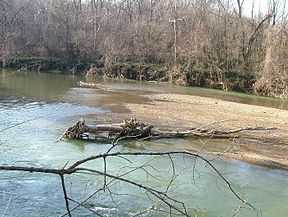Licking River (Ohio)
| Licking River | |
|---|---|
 The Licking River in Black Hand Gorge State Nature Preserve | |
| Origin | Newark in Licking County |
| Mouth | Muskingum River in Zanesville |
| Basin countries | USA |
| Source elevation | 800 ft (244 m) [1] |
| Mouth elevation | 680 ft (207 m) [2] |
| Basin area | 779 mi² (2,018 km²) [3] |

The Licking River is a tributary of the Muskingum River, about 40 mi (65 km) long, in central Ohio in the United States. Via the Muskingum and Ohio Rivers, it is part of the watershed of the Mississippi River.
Course
The Licking River is formed at Newark in Licking County by the confluence of its north and south forks including many other small fishable streams.
- The North Fork Licking River, about 35 mi (55 km) long, rises in southwestern Morrow County and initially flows generally east-southeastwardly through Knox County, past Centerburg, into Licking County, where at Utica it turns southwardly and flows past St. Louisville. In Licking County the North Fork collects the Otter Fork Licking River, which rises in Knox County and flows past Hartford; the Lake Fork Licking River; and the Clear Fork Licking River. The Lake and Clear forks both flow for their entire lengths in Licking County.
- The South Fork Licking River, about 30 mi (50 km) long, rises in southwestern Licking County and initially flows southeastwardly past Pataskala and Kirkersville and briefly enters Fairfield County, where it turns northeastwardly back into Licking County and flows past Heath.
From Newark the Licking River flows generally eastwardly through the Black Hand Gorge State Nature Preserve into Muskingum County, where it turns southeastwardly. It joins the Muskingum River at Zanesville; the confluence of the two rivers is spanned by a Y-shaped bridge.
Upstream of Zanesville, a U.S. Army Corps of Engineers dam causes the river to form Dillon Lake, along which an Ohio state park is located.
TRIVIA: Jonathan Chapman (1775-1843), aka Johnny Appleseed, planted his first apple orchard near Licking Creek. He took a load of apple seed from Pennsylvania cider presses into the Territory of Ohio in 1801, according to a Harper magazine article written in November 1871, "Johnny Appleseed - A Pioneer Hero" by W.D. Haley (pp. 830–836). .[4][5]
Long, long after, When settlers put up beam and rafter, They asked of the birds, "Who gave this fruit? Who watched this fence till the seeds took root? Who gave these boughs?" They asked the sky, And there was no reply. But the robin might have said, "To the farthest west he has followed the sun, His life and his empire just begun." Self-scourged, like a monk, with a throne for wages, Stripped, like the iron-souled Hindu sages, Draped like a statue, in strings like a scarecrow, His helmet-hat an old tin pan, But worn in the love of the heart of man, More sane than the helm of Tamerlane! Hairy Ainu, wild man of Borneo, Robinson Crusoe
-Johnny Appleseed!
And the robin might have said, "Sowing he goes to the far new West, With the apple, the sun of his burning breast- The apple allied to the thorn, Child of the rose." [6]
Variant names
According to the Geographic Names Information System, the Licking River has also been known as:
- Licking Creek
- Nepepenime Sepe
- Pataskala Creek
- Pataskala River
- Salt Lick Creek
See also
- List of Ohio rivers
References
- ↑ U.S. Geological Survey. Newark quadrangle, Ohio. 1:24,000. 7.5 Minute Series. Washington D.C.: USGS, 1983.
- ↑ U.S. Geological Survey. Zanesville-West quadrangle, Ohio. 1:24,000. 7.5 Minute Series. Washington D.C.: USGS, 1992.
- ↑ "Map of Ohio watersheds".
- ↑ http://www.appleappetite.com/Johnny.htm
- ↑ http://mason.gmu.edu/~drwillia/apple/ja2sm.html
- ↑ the beginning of Vachel Lindsay's 3-part poem entitled "In Praise of Johnny Appleseed
- Columbia Gazetteer of North America entry for Licking River
- DeLorme (1991). Ohio Atlas & Gazetteer. Yarmouth, Maine: DeLorme. ISBN 0-89933-233-1.
- GNIS entries for U.S. Geological Survey Geographic Names Information System: Licking River, U.S. Geological Survey Geographic Names Information System: Clear Fork Licking River, U.S. Geological Survey Geographic Names Information System: Lake Fork Licking River, U.S. Geological Survey Geographic Names Information System: North Fork Licking River, U.S. Geological Survey Geographic Names Information System: Otter Fork Licking River, U.S. Geological Survey Geographic Names Information System: South Fork Licking River
External links
- Blackhand Gorge State Nature Preserve website
- U.S. Army Corps of Engineers website for Dillon Lake
- Dillon State Park website